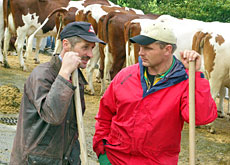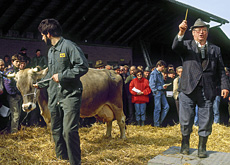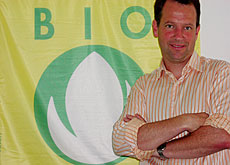Reform plans pruned for the farming sector

Swiss farmers have won a reprieve after parliament this week decided in principle to slow the pace of agriculture reform.
The government has been trying to push through reforms to make the farming sector more competitive on the world market.
A narrow majority in the House of Representatives – the larger chamber – followed the Senate in voting for a new law on agriculture. But the government’s reform plans were watered down.
Both houses of parliament approved a total of SFr13.65 billion ($11.21 billion) in payments to the sector over the next four years. This is SFr150 million more than the government wanted to give.
Among the main beneficiaries will be dairy farmers, as production and marketing subsidies for cheese making will be boosted.
The House also approved a proposal to allow cheaper imports of fertilisers, fodder and seed, as well as technical equipment including tractors.
Restrictions on the production of organic food will be eased, paving the way for conventional farmers to grow and sell certain products under the “bio” label.
The marathon discussions did not make too many happy faces in parliament. Three of the four main political parties threatened to try to bring down the reform package.
Economics Minister Doris Leuthard, who also holds the agriculture portfolio, had urged parliamentarians to be reasonable.
“Delaying the reforms could cost us more and have negative consequences for the farming sector. It depends what the next round of talks on trade liberalisation will bring and how Switzerland’s free trade agreements develop,” she said.
In decline
In the wake of the debate the rightwing Swiss People’s Party – traditionally representing the interests of parts of the rural population as well as small and medium-sized businesses – accused rival parties of failing to give more financial support to the farming sector.
“The [centre-right] Christian Democrats and the centre-left parties have only one goal. They want to speed up the decline of the farming community,” a statement said.
The People’s Party says the government’s reform policy of reducing production and export subsidies to use funds for so-called direct payments instead, is tantamount to turning farmers into gardeners.
But the main Swiss Farmers’ Association is not unhappy with parliament’s decisions.
“All in all the House of Representatives has amended the government’s agricultural policy. It showed its backing for a strong agriculture and food sector,” it said in a statement.
Jacqueline Forster of Bio Suisse, the umbrella organisation of organic farmers, says the discussions have been disappointing.
“As expected the debate proved that our ideas for more environmentally-friendly agriculture are not making progress in parliament,” she told swissinfo.
The long-standing debate on liberalising the agricultural sector is set to continue later this year.
Christmas present
The Swiss press focused on different aspects of the debate.
The Neue Zürcher Zeitung pointed out the contradictory statements by representatives within the People’s Party and the “unholy alliance” between the rightwing and the centre-left, the two arch-foes in the forthcoming general elections.
Der Bund from Bern chided parliament’s decision as short sighted because it made farmers believe they could escape increasing competition and block moves towards a liberalisation of agricultural markets.
Le Temps, for its part, highlighted the dramatic climax of the debate as the bill only narrowly passed the vote, not least because of a passionate appeal by the economics minister.
For the tabloid Blick, the agriculture lobby has won an important battle. It says the outcome of the debate was like a belated Christmas present.
swissinfo, Urs Geiser
Less than 4% of the Swiss population work in the agricultural sector, according to 2004 figures.
There were 64,466 farms, nearly 34,300 fewer than in 1985.
Organic farms account for about 11% of farmland.
The government is calling for a reduction in production and marketing subsidies, and a boost to so-called direct payments.
The aim is to make the farming sector more competitive on the international market amid moves to conclude further free trade agreements and steps by the World Trade Organization (WTO) to liberalise agricultural trade.
Discussions on agricultural reforms in parliament began last December. After the Senate, the House of Representatives joined the debate this week. It is due to continue this during its next session.

In compliance with the JTI standards
More: SWI swissinfo.ch certified by the Journalism Trust Initiative



You can find an overview of ongoing debates with our journalists here. Please join us!
If you want to start a conversation about a topic raised in this article or want to report factual errors, email us at english@swissinfo.ch.